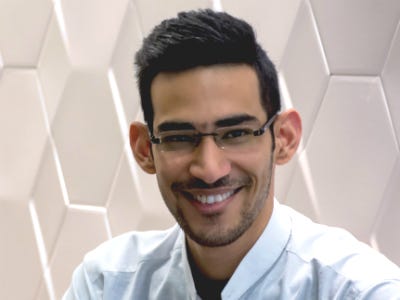PennApps Spin-Off Keriton Wins Big at SXSW
The South by Southwest Conference (SXSW) brings together innovators, artists and entrepreneurs from all over the globe, cross-pollinating ideas and looking for killer apps in a variety of fields.

At this year’s SXSW, Vidur Bhatnagar, a Robotics master’s student, took home a top prize from a medical innovation competition, netting $15,000 and a foot in the door at some of the largest children’s hospitals in the nation.
The Impact Pediatric Health pitch competition started with 125 proposals, narrowing down to 10 finalists that presented at the conference. Bhatnagar’s company, Keriton, was one of the two winners, taking the “digital health” category for healthcare-related IT projects.
Keriton makes a pair of matched apps that track breast milk in neonatal intensive care units, ensuring the right milk is delivered to the right baby, and providing coaching and feedback to moms that will help them to produce more.
The company got its start at PennApps, Engineering’s biannual weekend-long hackathon. Then called Lact-o-Log, Bhatnagar and team members Grishma Jena and Sneha Rajana got the idea from Penn Medicine nurses, who were on site to advise on health-related projects.
There, the team learned about the systems that NICUs use to make sure that a mother’s breast milk goes to her own baby, an arduous organizational task, given that mothers are encouraged to produce up to 16 bottles a day and nurses typically log each by hand. The stakes are also high: providing a baby with the wrong breastmilk is an infection risk.
“When I heard that most hospitals didn’t even have automated labeling, handwriting everything, it just blew my mind,” Bhatnagar says. “I couldn’t believe nurses had to do all of this manually.”

Lact-o-Log took second place at the Fall 2016 PennApps event, but Bhatnagar didn’t stop there. Pivoting away from the hardware elements developed at the hackathon, he continued to work with nurses and lactation consultants to zero in on what kinds of information nurses and mothers most needed in this area.
This insight allows Keriton to address some of the social and psychological factors that can pose a challenge in lactation management. For example, the app also allows nurses to send pictures and videos of the babies to their mothers.
“When moms are separated from their babies in the NICU, they’re missing some of the stimuli that helps them express more milk,” Bhatnagar says. “We’re trying to fill that gap digitally.”
“All of this stems from empirically proven, evidence-based practice, which is why we say Keriton was co-innovated with Penn Medicine nurses,” he says. “They were willing to share their problems so clearly, and from there, we sat down with lactation consultants day in and day out, in a continuous feedback loop.”

Bhatnagar attributes Keriton’s success to this kind of collaboration, along with the constant flow of ideas and support from different corners of Penn’s campus.
“The Penn ecosystem has come together beautifully to support young entrepreneurship,” Bhatnagar says. “It’s brilliant in the fact that from the Engineering campus at 34th and Walnut, Penn Medicine is two blocks away in one direction, Wharton is two blocks away in another direction, and everyone just works together so well.”
Beyond the validation that Penn Medicine expertise provided in Keriton’s pitch at SXSW, Bhatnagar says that the networks he has developed on campus have been invaluable in getting his company off the ground.
“Dean Kumar and Roy Rosin, the Chief Innovation Officer at Penn Medicine, are on our advisory board,” he says. “Nowhere but at Penn would we have that kind of support.”
